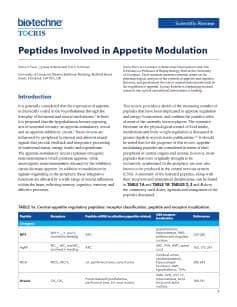NK3 Receptors
The neurokinin 3 (NK3) receptor is a member of the tachykinin family of G-protein-coupled receptors which also includes NK1 and NK2 receptors. The NK3 receptor is predominantly expressed in the CNS (including the hippocampus, hypothalamus and substantia nigra).
NK3 Receptor Agonists |
|
|---|---|
| Cat. No. | Product Name / Activity |
| 1068 | Senktide |
| Tachykinin NK3 agonist | |
NK3 Receptor Antagonists |
|
| Cat. No. | Product Name / Activity |
| 1393 | SB 222200 |
| Potent, selective non-peptide NK3 antagonist. Brain penetrant | |
| 3297 | SSR 146977 hydrochloride |
| Potent and selective NK3 antagonist | |
The neurokinin 3 (NK3) receptor is a member of the tachykinin family of G-protein-coupled receptors which also includes NK1 and NK2 receptors. The NK3 receptor is predominantly expressed in the CNS (hippocampus, hypothalamus, substantia nigra, dorsal horn of the spinal cord) with limited expression in the periphery.
NK3 receptors are thought to mediate afferent neuron transmission and intestinal motility and secretion. The receptor displays greater potency for the endogenous agonist neurokinin B than neurokinin A and substance P (NKB > NKA > SP). The human gene encoding the NK3 receptor has been localized on chromosome 4 (4q25).
External sources of pharmacological information for NK3 Receptors :
Literature for NK3 Receptors
Tocris offers the following scientific literature for NK3 Receptors to showcase our products. We invite you to request* your copy today!
*Please note that Tocris will only send literature to established scientific business / institute addresses.
Peptides Involved in Appetite Modulation Scientific Review
Written by Sonia Tucci, Lynsay Kobelis and Tim Kirkham, this review provides a synopsis of the increasing number of peptides that have been implicated in appetite regulation and energy homeostasis; putative roles of the major peptides are outlined and compounds available from Tocris are listed.
